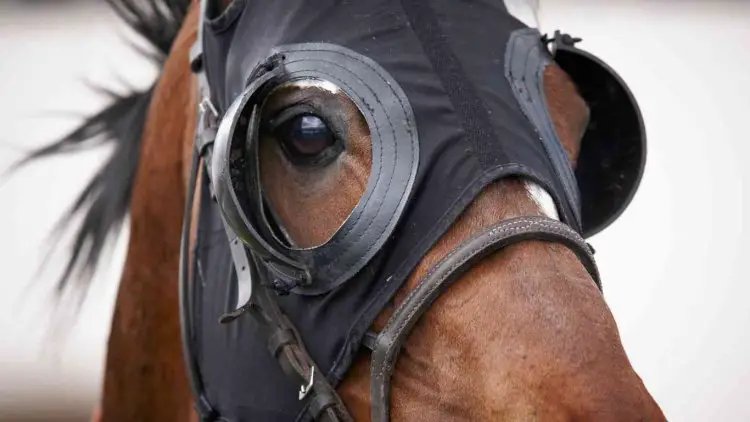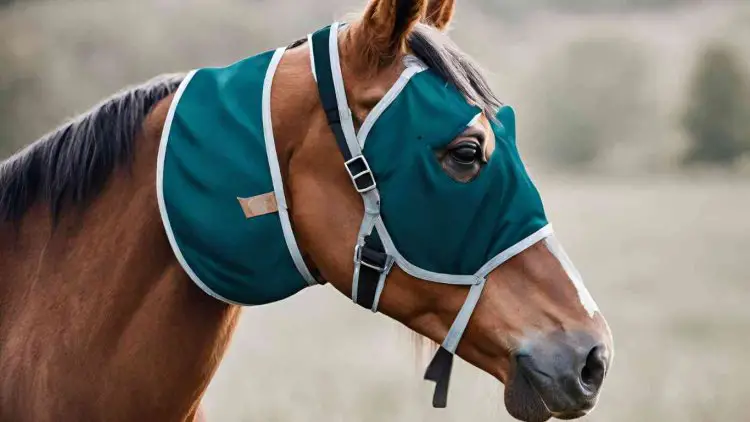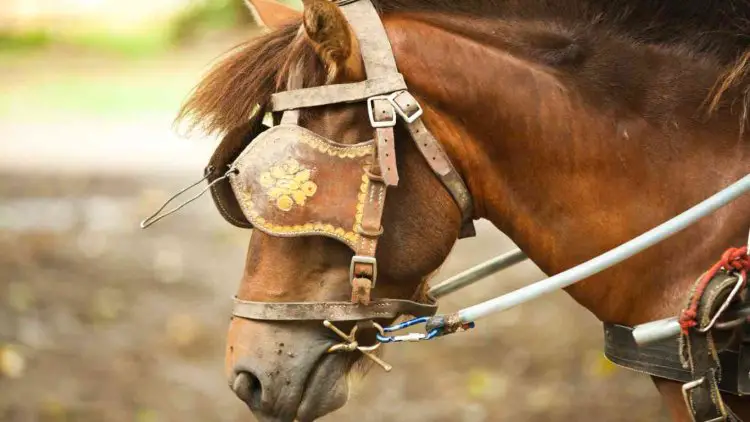Why do People Cover Horse Eyes? Benefits, Types & More
Have you ever wondered why horse owners cover their horse's eyes? Dive into the world of horse care as we explore the benefits of covering a horse's eyes, from protection against flies and insects to reducing stress and anxiety. Discover the types of horse eye coverings, when to use them, and how to ensure a proper fit. Learn about common mistakes to avoid and get answers to FAQs. Join us in ensuring the well-being of our gentle giants by understanding the importance of eye coverings.

Table of Contents
Introduction
Have you ever passed by a horse with its eyes covered and wondered, "Why do they cover horses' eyes?" If so, you've arrived at the right spot because I’m here to unravel the mystery behind this. Hang tight as we ride through the wonderful world of horses and explore the essentials of eye coverings.
Benefits of Covering Horse's Eyes
Alright! Here we go, bursting out of the starting gate. First off, let’s talk about the numerous perks of covering horses' eyes.
Protection from Flies and Insects
The flies and insects might seem small, but for our four-legged friends, these buggers can cause considerable discomfort. Life can be pretty irritating for our equine buddies if pesky flies and bugs make their eyes a personal hangout spot. Imagine your eyes being a landing strip for flies every few minutes. Annoying, isn’t it? Additionally, bugs carry diseases. Hence, covering the eyes acts as a reliable shield against these minute tormentors, assuring our horses a day full of peace rather than swatting their heads all the time.
Reducing Stress and Anxiety
Notice any changes in your horse's behavior? Like being overly jumpy or restless? Some horses get easily affected by their surroundings, rendering them anxious. Eye coverings serve as a screen, filtering out unnecessary stimuli, reducing stress, and helping our equine buddies maintain an even keel.
Protecting Against Sunlight and Glare
Just like the sun's rays can be harmful to humans, they can also damage a horse's eyes. Applying eye coverings can ward off sunlight and glare, contributing to the overall health of your horse's eyes. Proper eye coverings provide protection from those harmful sun rays, ensuring your horse can enjoy a day out in the sun without risking its eyesight.
Related: Understanding Roach Back in Horses: Causes & Care
Types of Horse Eye Coverings
Now that we understand why we cover horse's eyes, it's time to delve into the types of coverings available.

Your horse beauty queen definitely needs her mask! Fly masks are composed of softly lined mesh material that covers the eyes and, in some designs, extends to protect the ears. They're lightweight, breathable, and are designed to keep those nasty bugs away and even obstruct harmful UV rays.

Then, there's the blinkers, also known as blinders. These are used primarily to keep horses focused during races or parades. They limit their peripheral vision and are cleverly designed tools that limit the peripheral vision of our four-legged friends, helping them concentrate on what's directly ahead, and minimizing distractions and surprises.
Choosing the Right Time for Eye Covering
Every horse might have individual needs, and some circumstances might demand more consistent use of eye coverings. But generally, they're used depending on the season and during specific activities like riding or trailering. It's a simple rule, really. Flies in summer? On goes the fly mask. Sunny day? Time for a UV protective mask.
How to Properly Fit and Use Eye Coverings
Correctly fitting and using eye coverings is critically important. A poorly fitted mask can cause more harm than good—ranging from chafing to reducing the horse's ability to see. So be cautious! Adjust the straps till they fit snugly, and always ensure visibility. Also, keep it clean. Your horse might not thank you verbally, but its contented neigh says it all!
Common Mistakes to Avoid
Although eye coverings are great, they can cause problems if used improperly. Beware of these common pitfalls:
Overusing Eye Coverings
Coverings are great, but remember, moderation is key. Wearing masks 24/7 can lead to irritation, and possible infections, and may even cause your horse to stumble upon unseen obstacles.
Ignoring Eye Health
A mask isn't a cure-all. Even with regular use of coverings, continue to regularly check your horse’s eyes for any abnormalities. Regular checks are necessary to spot any issues early.
Improperly Fitted Masks
Just like uncomfortable shoes can ruin your day, an ill-fitting mask can cause discomfort, or worse, accidents. Too tight or too loose, and we have a problem. To avoid discomfort or potential accidents, make sure the mask aligns perfectly with your horse's face.
FAQs
What is the purpose of covering a horse's eyes?
Covering a horse's eyes primarily serves two compelling reasons - protection and vision control. Some coverings like fly masks protect our four-legged friends' eyes from annoying flies and other irksome insects, especially during those pesky summer months. They're lightweight, breathable, and are designed to keep those nasty bugs away and even obstruct harmful UV rays.
Why do horse owners cover their horse's eyes with blinkers?
Ah, blinkers (or blinders), are an interesting creation, right? Well, blinkers serve a rather specific purpose. They're mainly designed to keep the horse’s attention straight ahead and get rid of any peripheral distractions. They're often used in carriages or race horses because an unexpected side view of a noisy crowd can startle the horse, causing an unfortunate change in pace or direction. In short, blinkers are a nifty tool in a horse's world to help them focus!
Why can't you look a horse in the eye?
Well, you could, but you might not get the reception you expect. See, looking directly into the eyes of a horse, especially one you're not familiar with, can be perceived as a challenge or a threat. Just like how in the wild, many animals regard direct eye contact as an aggressive behavior. So, when it comes to horses, it's often better to approach from the side and allow the horse to see and smell you first, before establishing eye contact. Life's all about making cozy introductions, right?
Conclusion
Well, we've galloped through the reasons why covering a horse's eyes is essential, the various types of eye coverings, how to use them effectively, and even the pitfalls to avoid. It's obvious, isn't it? Our gentle giants need these protective barriers to continue being the amazing creatures they are.
Remember, every horse is unique, and their need for eye coverings will vary. So, your decisions must be centered around your horse's comfort and health. But don't forget, you don't have to go it alone. A simple conversation with an equine expert or veterinarian can show you the right path.
What's Your Reaction?

















